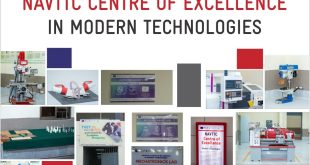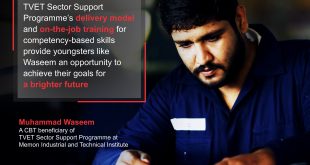The city of Muzaffargarh lies along the bank of the Chenab River. This proximity is a boon for its thriving agricultural sector. In 2010, however, the area was shown the devastating downside of being so close to a thundering watercourse when it experienced one of the worst floods in the region’s history, drowing countless villages and localities in its path. For hundreds of thousands of people, it meant the end of their lives as they knew them. From their humble situations they were thrust into even greater turmoil, and for many, the period of struggle has still not come to an end.
It was with the aim of lending these victims of the flood a chance at self-uplift that the Punjab Vocational Training Council launched a free training program for 33 of their young men in the field of welding and fabrication at the Vocational Training Institute (VTI) in Muzaffargarh.
The project has been launched at a cost of Rs. 11.05 million under the Fund for Innovative Training, an initiative of the Technical and Vocational Education and Training Reform Support Programme. This multi-lateral initiative is co-funded by the European Union, the Embassy of the Kingdom of the Netherlands, and the Federal Republic of Germany and is being implemented in Pakistan by the GIZ.

Admission into the course was reserved for only the most deserving candidates who had suffered directly or indirectly from the floods. The applications received far outnumbered the seats available, so the final decisions were based on a simple aptitude test and an interview.
 Muhammad Asif, 18, is one of the trainees and hails from Qasba Gujrat, situated at a distance of 40 to 50 kilometers (depending on the route he adopts) from the VTI. He lost everything in the floods and has had to rebuild his life from scratch. Asif, another trainee, has his parents, four brothers, and a grandfather to look after. His father is a mason but in poor health, so Asif realized that he himself would have to support the family financially and undo the losses they had suffered. A friend told him about the training course being offered and he applied immediately. “Such opportunities don’t knock on your door twice,” Asif enthuses. “We’re getting world-class training on the most modern machines absolutely free. We also get free uniforms, free books and a Rs. 2,000 stipend. It’s almost like a fairytale!”
Muhammad Asif, 18, is one of the trainees and hails from Qasba Gujrat, situated at a distance of 40 to 50 kilometers (depending on the route he adopts) from the VTI. He lost everything in the floods and has had to rebuild his life from scratch. Asif, another trainee, has his parents, four brothers, and a grandfather to look after. His father is a mason but in poor health, so Asif realized that he himself would have to support the family financially and undo the losses they had suffered. A friend told him about the training course being offered and he applied immediately. “Such opportunities don’t knock on your door twice,” Asif enthuses. “We’re getting world-class training on the most modern machines absolutely free. We also get free uniforms, free books and a Rs. 2,000 stipend. It’s almost like a fairytale!”
“These training courses cannot be compared to those offered at any other institution,” proclaims Muhammad Aslam, laboratory assistant at the VTI.
 “Here, students get practical experience of working on sophisticated TIG and MIG machines – a privilege unknown to others. Even the theoretical part of their instruction is based on the industry’s most current needs.” Ghulam Shabbir, 22, was forced by financial constraints to leave school in 2007 and has since then been involved in the welding trade.
“Here, students get practical experience of working on sophisticated TIG and MIG machines – a privilege unknown to others. Even the theoretical part of their instruction is based on the industry’s most current needs.” Ghulam Shabbir, 22, was forced by financial constraints to leave school in 2007 and has since then been involved in the welding trade.
While he managed to return and complete his Matric in 2010 (in the nick of time: his school was also washed away by the floods), the hardships at home prevented him from studying further. He has a wife, a brother, and elderly parents to support. His father’s Rs. 3000 pension does not even come close to fulfilling the family’s expenditure and his younger brother is still in school and hence cannot contribute.
Shabbir attends the institute from 8am to 4pm and then puts in an evening shift at a workshop, where he is in charge of supervising the staff in the boss’s absence. “There are many welders who have been in the profession for years but they have learnt through trial and error methods,” he remarks. “They do not have the theoretical knowledge nor have they learnt the trade under experts’ supervision. I have been lucky enough to possess this knowledge and that’s why my boss trusts me so much.”
The content of the curriculum has even attracted students who are already highly qualified. Muhammad Zahid holds a Diploma in Associate Engineering from the Government Polytechnic Institute, Qasimpur Colony, Multan, but had been unable to find employment. Initially, he was reluctant to join a training course in which the other trainees would be far less educated than he was. Once he learned of the importance of the course offered under the FIT programme and that he, with his higher qualification, would be eligible for the job of a fabricator, which was senior to a welder, he changed his mind.
“I have an edge over the others as I can make drawings, suggest measurements for a structure, and apply different engineering formulas – which the others can’t,” he expresses with pride.

Zahid belongs to Shah Garh, which is situated at a distance of 25 kilometers from Muzaffargarh. Like his course mates, he also comes from a family hit by the disastrous floods of 2010 when the waters washed away a large part of his house.
His father is a loader who is often out of work and so the onus of providing for the family falls on Zahid’s shoulders. “This training course is a blessing for me,” he says. It’s a sentiment that most of his course mates would agree with.
 Pakistan TVET REFORM Support Programme Technical and Vocational Education and Training (TVET) Reform support Programme
Pakistan TVET REFORM Support Programme Technical and Vocational Education and Training (TVET) Reform support Programme









